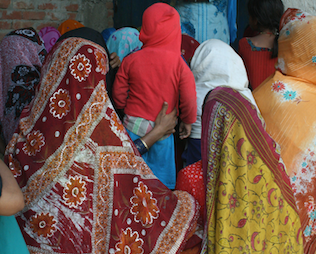Research into women's groups activities and their potential to affect child development and child protection outcomes

Project Summary
This study funded by the Bernhard van Leer Foundation covers two sites:
- Dhanusha district in the southern plains of Nepal
- Orissa and Jharkhand states of India
The main objective is to conduct formative research into child stimulation and complementary feeding, so as to inform the design of new interventions involving community mobilization through women’s groups in improved feeding and stimulation of children under 2.
In Nepal, the project aims to follow-up womens groups that were involved in an already-completed cluster randomised controlled trial to assess the effect of community mobilisation upon neonatal mortality, care seeking, care practices and nutritional status of women and young children. In Nepal the work is complementary to a formative research study being conducted with funds from the UBS Optimus Foundation.
UCL is working in partnership with Mother and Infant Research Activities (MIRA) a Nepalese non- governmental organisation (NGO) at their site in Dhanusha district Nepal, headed by Prof Dharma S. Manandhar and with Ekjut, an NGO based in Jharkand and Orissa, headed by Dr Prasanta Tripathy.
Details of the research questions being answered by this research project are provided below:
Women’s group mapping
- What kinds of strategies and activities did women’s groups take on in the past three years and what did they achieve?
- What factors differentiated those that were most successful from the rest (e.g. leadership, group size, broad-based support, type of projects they took on, available resources, shared beliefs, taking responsibility, and so on)?
Formative research into potential for working on child development and protection
- What kinds of play and stimulation activities are commonly undertaken by parents, care givers and children in our working areas?
- What kind of methods of “disciplining” children are most commonly used?
- What are families' and mothers' views on stimulation, learning and protection?
- How do existing women’s group members think that these issues could be incorporated into their group activities?
- Can existing tools to assess child development at individual and community levels (Bayley III and Multiple Indicator Cluster Survey Early Childhood Development module) be successfully adapted for use in our working areas?
- What child protection indicators (e.g. birth registration and indicators related to child discipline) can be integrated into surveillance systems in our working areas?
Women’s group mapping
- How did women’s groups progress after removal of inputs from MIRA?
- How autonomous have groups become and by what means?
- What are the characteristics of groups who sustained activities after removal of inputs compared with groups that did not?
Formative research into child development and protection
- Are there any detectable differences in child development or stimulation between control and intervention groups or between children of women’s group members and others?
Ongoing analyses and formative studies in Dhanusha are already undertaking vital registration in our study areas, investigating the effect of the groups on child anthropometry and growth, and quantitative and qualitative research into effects of groups upon maternal mental health.
In Ekjut, a cross-sectional survey of women’s group areas is planned in mid- to late- 2012. Tools and indicators that are found to be acceptable after piloting (e.g. the BINS, PEDS and MICS ECD module) can be integrated into this survey to obtain estimates of the proportion of children at risk of development delay as well as indicators regarding child development and protection in our working areas.
 Close
Close

